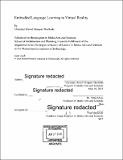Embodied language learning in virtual reality
Author(s)
Vázquez Machado, Christian David
DownloadFull printable version (12.53Mb)
Other Contributors
Program in Media Arts and Sciences (Massachusetts Institute of Technology)
Advisor
Pattie Maes.
Terms of use
Metadata
Show full item recordAbstract
Embodied theories of language propose that the way we communicate verbally is grounded in our body. Nevertheless, the way a second language is conventionally taught does not capitalize on embodied modalities. The tracking and immersive capabilities of virtual reality systems can enable a change in the way students learn language by engaging them in kinesthetic activities that explicitly use body movement to encode knowledge. The body can also be used implicitly to alter a student's perception of themselves in order to enhance the way they approach learning in immersive environments. In this work, we seek to explore the potential of both explicit and implicit embodied language learning using virtual reality as a platform. For the purpose of this thesis we focus on vocabulary acquisition to assess the potential impact these methodologies can have on language education. Two systems were developed that afford explicit (Words in Motion) and implicit (Inner Child) embodied learning. Both systems were evaluated separately during controlled experiments with 6o participants each. Explicit embodied learners displayed enhanced retention positively correlated with performing actions in the Words in Motion platform. Our findings from the implicit embodied study highlight the importance of having a body in virtual reality. Inner Child successfully increased word retention when inducing a subjective age reduction that correlated with the feeling of ownership of a virtual child avatar. These results support the hypothesis that virtual reality can deeply impact language learning by leveraging the body explicitly and implicitly.
Description
Thesis: S.M., Massachusetts Institute of Technology, School of Architecture and Planning, Program in Media Arts and Sciences, 2018. Cataloged from PDF version of thesis. Includes bibliographical references (pages 87-93).
Date issued
2018Department
Program in Media Arts and Sciences (Massachusetts Institute of Technology)Publisher
Massachusetts Institute of Technology
Keywords
Program in Media Arts and Sciences ()